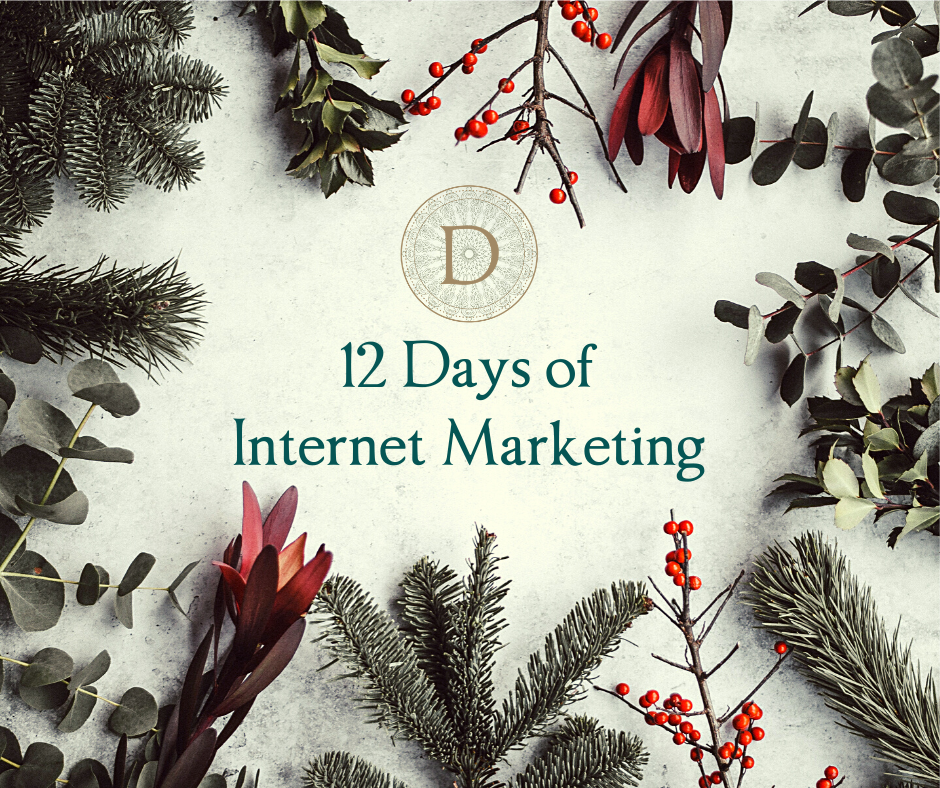
The 12 Days of Digital Marketing: Day 4
Welcome to Day 4 of The 12 Days of Digital Marketing.
Every day, we’ll answer a marketing question sent in by people like you. Even if—especially if! the phrase “internet marketing” produces deep nausea or dread. We’re here to show you how it’s all about connection and authenticity.
Q.
What’s the deal with SEO? I keep hearing that I need it for my website, but how do I get it? Do I need to hire an agency to figure out my keywords? How DO keywords work? What’s the difference between “organic optimization” and “chasing keywords”?
–Overwhelmed in Ontario
A.
Dear Overwhelmed,
SEO, or Search Engine Optimization, is a lot less complicated than some people would have you believe. To be fair, they’re important if you want people to find your website when they’re searching for the things you have to offer, but it’s the sort of thing that sounds a lot more difficult than it really is.
When we write website copy, we do what is known as “organic optimization,” which means we use keywords naturally in the flow of the copy. If you’re a financial planner, we make sure to use the exact phrase “financial planner” early in the page, and probably a few times throughout just to drive the point home to search engines. The benefit of organic optimization is that the search engines get what they need to figure out what your site is for, and when readers get there, it’s actually designed with their experience at the forefront.
We definitely don’t recommend trying to pack your copy with keywords, unless there’s a very specific term you’re hoping to target.
For example, if you have a financial planning business that is located in Philadelphia and works mainly with in-person clients (as opposed to exclusively virtual), we might work the phrase “Philadelphia financial planner” into your prime keyword locations, but we’re not going to build a page around saying “Philadelphia financial planner,” “Pennsylvania financial planner,” “financial planner near me,” and “local financial planner,” because that website is going to look like a scam to the person who’s reading it, instead of forging that authentic connection that leads them to want to work with you.
An SEO report is going to give you a lot of suggestions like those, and it’s true, if you can find a way to work all of those phrases into your page, search engines are going to understand what you’re all about much more easily…but to what end? If you can get readers on your site but then scare them off as soon as they’ve arrived, you’re working against yourself.
Instead, try to choose the most important search terms for your business on each page. Make it relevant to the content, and don’t get cutesy—you’re a financial planner, not a “money maestro” or an “oracle of coin.” No one is searching those terms, and search engines are just not smart enough to make the connection.
Content matters, so make sure you’re including enough on each page to trigger search engines to see the value. A webpage with 100 words is not viewed as being as valuable as one with 500, as far as search engines are concerned. Again, reader experience is key, but if you can give them 500 words of value and not just ramble to get your word count, it’s going to benefit them and you. Links to other pages on your website and the outside sites help search engines recognize your site as valuable and authentic, too.
Make sure you’re making use of your formatting tags. H1 headings should only be used once per page, without exception. H2 can be used more than once, but don’t overdo it. Most of the page should be formatted as a paragraph.
Finally, make use of your SEO plugin. Most WordPress themes come with one already installed, but you can find one you like pretty easily if yours doesn’t. There should be fields for SEO title, description, and keywords, and it’s worthwhile to include all of those (and actually read the “warnings” the plugin gives you, though it’s okay if every page isn’t perfect).
Wishing you a perfectly whelmed rest of your winter,
-Emma & Katie
Have a burning question of your own? Email us at info@dossieragency.com. We’re keeping all questions anonymous, so be as upfront as you need to be, and don’t worry about feeling silly. Chances are, lots of other people need to hear the answer, too.
